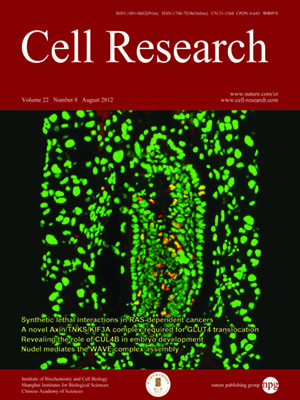
Volume 22, No 8, Aug 2012
ISSN: 1001-0602
EISSN: 1748-7838 2018
impact factor 17.848*
(Clarivate Analytics, 2019)
Volume 22 Issue 8, August 2012: 1285-1303
ORIGINAL ARTICLES
N-methylpurine DNA glycosylase inhibits p53-mediated cell cycle arrest and coordinates with p53 to determine sensitivity to alkylating agents
Shanshan Song1,2,3, Guichun Xing2,3, Lin Yuan2,3, Jian Wang2,3, Shan Wang2,3, Yuxin Yin4, Chunyan Tian2,3, Fuchu He1,2,3 and Lingqiang Zhang2,3
1Department of Medical Genetics, Institute of Basic Medical Sciences, Chinese Academy of Medical Sciences & Peking Union Medical College, Beijing 100005, China
2State Key Laboratory of Proteomics, Beijing Proteome Research Center, Beijing Institute of Radiation Medicine, Beijing 100850, China
3National Engineering Research Center for Protein Drugs, Beijing 100850, China
4Department of Pathology, School of Basic Medical Sciences, Peking University, Beijing 100191, China<
Correspondence: Fuchu He, Lingqiang Zhang,(hefc@nic.bmi.ac.cn; zhanglq@nic.bmi.ac.cn)
Alkylating agents induce genome-wide base damage, which is repaired mainly by N-methylpurine DNA glycosylase (MPG). An elevated expression of MPG in certain types of tumor cells confers higher sensitivity to alkylation agents because MPG-induced apurinic/apyrimidic (AP) sites trigger more strand breaks. However, the determinant of drug sensitivity or insensitivity still remains unclear. Here, we report that the p53 status coordinates with MPG to play a pivotal role in such process. MPG expression is positive in breast, lung and colon cancers (38.7%, 43.4% and 25.3%, respectively) but negative in all adjacent normal tissues. MPG directly binds to the tumor suppressor p53 and represses p53 activity in unstressed cells. The overexpression of MPG reduced, whereas depletion of MPG increased, the expression levels of pro-arrest gene downstream of p53 including p21, 14-3-3s and Gadd45 but not proapoptotic ones. The N-terminal region of MPG was specifically required for the interaction with the DNA binding domain of p53. Upon DNA alkylation stress, in p53 wild-type tumor cells, p53 dissociated from MPG and induced cell growth arrest. Then, AP sites were repaired efficiently, which led to insensitivity to alkylating agents. By contrast, in p53-mutated cells, the AP sites were repaired with low efficacy. To our knowledge, this is the first direct evidence to show that a DNA repair enzyme functions as a selective regulator of p53, and these findings provide new insights into the functional linkage between MPG and p53 in cancer therapy.
Cell Research (2012) 22:1285-1303. doi:10.1038/cr.2012.107; published online 17 July 2012
FULL TEXT | PDF
Browse 2339


